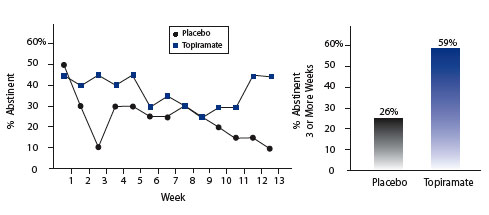In a small pilot study, topiramate—a medication currently used to treat seizure disorders—has helped cocaine-addicted outpatients stay off the drug continuously for 3 weeks or more. That may not seem like a long time, but previous research has shown that outpatients who avoid relapse for 3 to 4 weeks during treatment with behavioral therapy and medication have a good chance of achieving long-term cessation. In other clinical trials topiramate has helped prevent relapse to alcohol and opiate addiction; these new results with cocaine add to hopes that it may prove a versatile treatment medication for several drugs of abuse.
 Topiramate Helps Outpatients Abstain From Cocaine In almost every week of the study, more patients were abstinent in the topiramate group than in the placebo group. Of the 40 participants in the study, more patients taking topiramate achieved 3 or more continuous weeks of abstinence from cocaine.
Topiramate Helps Outpatients Abstain From Cocaine In almost every week of the study, more patients were abstinent in the topiramate group than in the placebo group. Of the 40 participants in the study, more patients taking topiramate achieved 3 or more continuous weeks of abstinence from cocaine.Dr. Kyle M. Kampman and colleagues at the University of Pennsylvania School of Medicine and the Veteran Affairs Medical Center in Philadelphia treated 40 crack-cocaine-smoking outpatients, mostly African American males, for 13 weeks at the University of Pennsylvania Treatment Research Center (TRC). All participants met the Diagnostic and Statistical Manual of Mental Disorders, 4th Edition (DSM-IV) criteria for cocaine dependence. They were typical of the chronic, relapsing abusers who seek treatment at the TRC: They abused cocaine an average of 10 years, preferring crack to the powder form, and demonstrated the average level of drug-related problems. However, participants' abuse was atypical in one way; they were on the "milder end of the addiction severity spectrum measured by cocaine withdrawal symptom severity and days of abuse and money spent on cocaine," says Dr. Kampman. On average, participants abused cocaine 6 to 8 days and spent $300 to $500 on the drug in the month before treatment compared with the 10 to 13 days and $400 to $600 reported by most patients at the facility. Because topiramate exacerbates cocaine withdrawal symptoms, the investigators selected patients who were able to attain at least 3 days of self-reported abstinence immediately before starting the trial and who, based on their level of addiction, were not likely to enter severe withdrawal. Dr. Kampman says that about 40 percent of patients treated at the TRC experience relatively mild withdrawal symptom severity.
After a 1-week baseline period, Dr. Kampman's team gave topiramate to 20 study participants, and placebo to the other 20. To avoid potential topiramate side effects, including sedation and slurred speech, they initiated treatment with 25 mg/d and increased it by 25 mg/d every week to 200 mg/d. They maintained this maximum dose during weeks 8 through 12, then tapered to zero during week 13. The patients also received cognitive behavioral coping skills therapy twice weekly throughout the study. The researchers verified cocaine abstinence two times a week with urine tests.
By the end of the 13th week, almost 60 percent of patients taking topiramate attained 3 or more weeks of continuous abstinence from cocaine compared with 26 percent of those taking placebo. All 40 patients showed improvement from week 1 to week 13, as reflected by lower Addiction Severity Index (ASI) scores. Patients taking the medication improved more, with average scores in the topiramate group falling by 69 percent, from 0.210 to 0.066, compared with 50 percent, from 0.162 to 0.081, in the placebo group. Dr. Kampman says the improvement in ASI scores reflects fewer days of cocaine abuse and patients' perceptions of reduced cocaine-related problems. "Patients saw the improvement in their condition, which is an important part of recovery," he says.
"Based on our findings and other work showing this medication's effectiveness as a treatment for alcohol and opiate addiction, topiramate appears to have great potential as a relapse prevention medication for people who have achieved initial abstinence from cocaine," says Dr. Kampman.
Possible Mechanisms
All addictive drugs deliver pleasurable effects by enhancing the neurotransmitter dopamine in the mesocorticolimbic pathway—areas of the brain involved in reward and motivation. Topiramate seems to change the brain's response to cocaine by indirectly influencing dopamine through two other neurotransmitter systems—gamma aminobutyric acid (GABA) and glutamate. Animal studies have suggested to scientists that either activating GABA-producing neurons or blocking glutamate receptors would lessen craving in cocaine-addicted human subjects. "Topiramate does both simultaneously, a unique dual action that appears to underlie its promise as a relapse prevention medication," says Dr. Kampman.
"These are preliminary results, but researchers are very excited about the potential topiramate has shown as a treatment for a range of problems, including addiction to several drugs and some impulse control disorders," says Dr. Frank Vocci, director of NIDA's Division of Pharmacotherapies and Medical Consequences of Drug Abuse. In addition to its initial successes in preventing relapse in patients with alcohol, opiate, and now cocaine addiction, animal studies have suggested it may attenuate nicotine addiction. "Topiramate may prove an effective treatment for patients who are addicted to multiple drugs," Dr. Vocci adds.
Dr. Kampman plans additional studies to further evaluate topiramate as a treatment for cocaine addiction. In addition to confirming the present results, obtained with African American male crack smokers, the medication must be tried in other racial groups, women, and powder-cocaine abusers. Dr. Kampman and his colleagues also plan to study topiramate therapy for patients with coexisting cocaine and alcohol addiction—a group that comprises half of people treated for cocaine abuse.
Source:
- Kampman, K.M., et al. A pilot trial of topiramate for the treatment of cocaine dependence. Drug and Alcohol Dependence 75(3):233-240, 2004. [Full Text]
